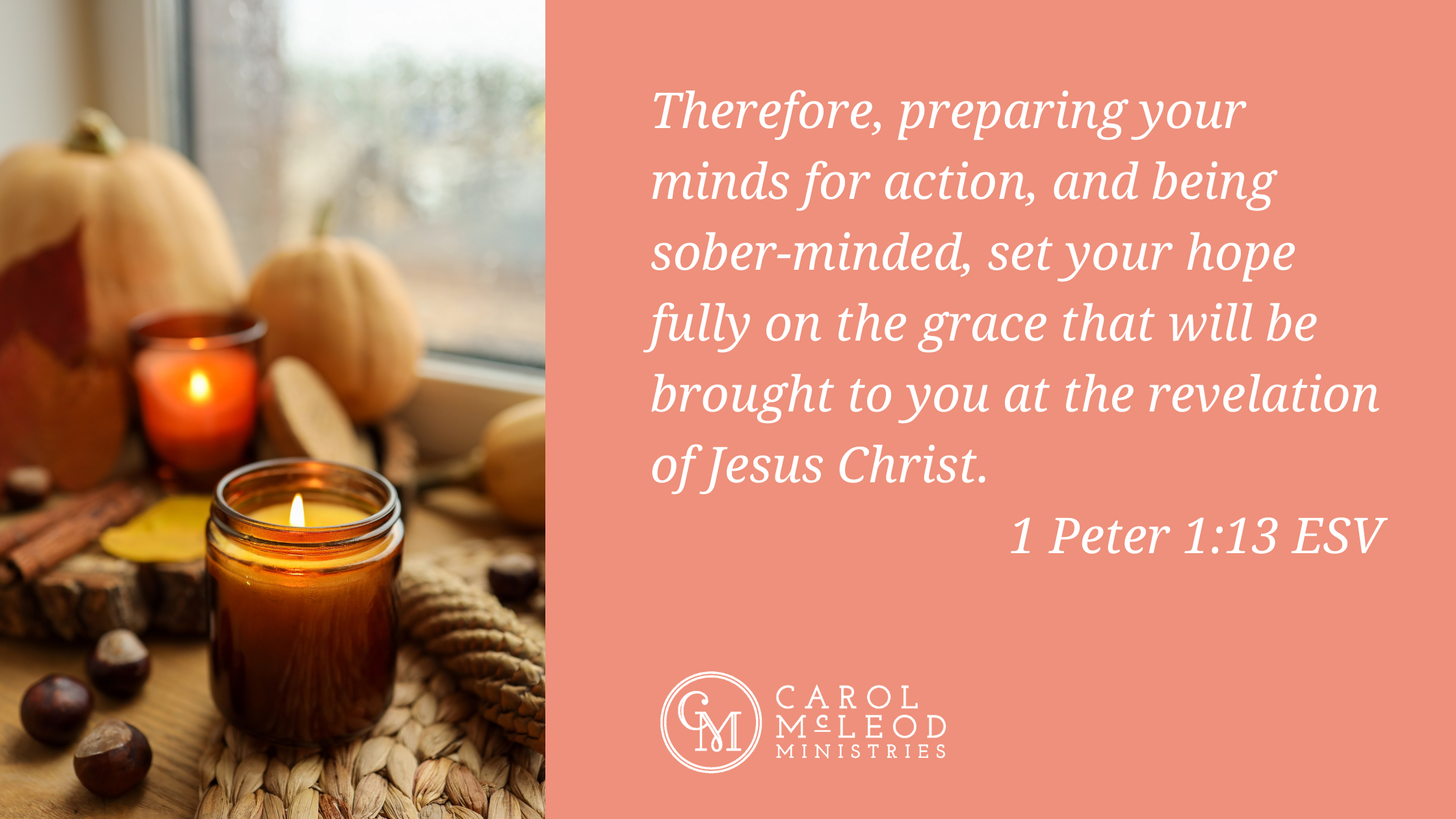
When I was growing up, one of my dad’s favorite ways to encourage me to do something I didn’t want to do like clean my room, eat my vegetables, or be nice to my brother, was to tell me, “It’ll put hair on your chest!” I did not then, nor do I now, want hair on my chest, thank you very much! These character-building exercises may have been good for me, but I preferred my unmade bed, candy for dinner, and not sharing my toys. I may have needed to do these things, but I didn’t want to.
It’s against my human nature to ask God for what I need instead of what I want. My prayers are pretty much like, “Please make all these things better, make us happy and healthy, shower us with good things, keep the blessings flowing, and keep us safe, in Jesus’s name, amen. PS: If you could do that right now, that would be good.” Or maybe that’s just me?
Instead of wanting only good things, the apostle Peter tells us to hope for grace.
Therefore, preparing your minds for action, and being sober-minded, set your hope fully on the grace that will be brought to you at the revelation of Jesus Christ. 1 Peter 1:13 NIV

A woman in the Bible who knew Peter’s perspective about grace is Peter’s wife. We know Peter had a wife because he had a mother-in-law who was healed by Jesus (Matthew 8:14). We know from Paul’s writing that the apostles’ wives traveled with them, and he specifically referenced Peter’s wife (1 Corinthians 9:5). Although Peter’s wife’s name is never given, her marriage with Peter was likely the model for his writing about women, husbands, and wives. And if being married for over thirty years myself has taught me anything, I’ll bet she proofread this letter to the early church before Peter mailed it.
Peter’s wife would have wondered why he was late getting home from work the day he met Jesus, because she was probably waiting for his fresh catch from the sea to prepare their dinner. Jesus stayed at her home and knew her name, and she would have hugged him tight after he touched and healed her mother. It’s quite likely she was at the Last Supper with the other disciples’ families. She would have held Peter as he wept after denying Jesus, and she was probably hiding with him in the upper room after the crucifixion and she surely would have rejoiced with her husband when he was reaffirmed by Jesus after his resurrection. She would have been worried for Peter when he was in prison, and she traveled with him while he ministered to the church and wrote his letters.
Peter’s death wasn’t recorded in the Bible, but historical writings from the first century tell us he was crucified. These reports tell us that Peter didn’t think he was worthy of being killed in the same manner as Christ, so he asked to be crucified upside down. An early church historian named Eusebius referenced the traditional view that Peter and his wife were both martyred for their faith in Christ on the same day:
“When the blessed Peter saw his own wife led out to die, he rejoiced because of her summons and her return home, and called to her very encouragingly and comfortingly, addressing her by name, and saying, “O thou, remember the Lord.” Such was the marriage of the blessed, and their perfect disposition toward those dearest to them.”
Peter practiced what he preached. The man who wrote, “Rejoice, though now for a little while, if necessary, you have been grieved by various trials” (1 Peter 1:6), did indeed rejoice at the grievous sight of his own wife being led out to die. Keeping his eyes on Jesus kept Peter’s eyes off the clock as it wound down toward their deaths. Peter and his wife learned from Jesus how to look at their crosses with joy and gladness. Peering inside Jesus’s empty tomb gave Peter a new perspective about his own grave. Watching Jesus ascend to heaven gave him hope for the here and now. The exiles were finally returning home!
And Eusebius—you were so close! Why didn’t you just tell us her name? Some people think St. Peter will greet us at the gates of heaven, and if that’s true I hope his wife is standing right there beside him with the other unnamed women of the Bible like Peter’s mother-in-law (Mark 1:30), the woman with the issue of blood (Mark 5:25–34), the widow with two coins (Mark 12:41–44), the Samaritan woman at the well (John 4:7–43), and the woman caught in adultery (John 8:3–11). Their names may escape us, but their stories have shaped us because even anonymous encounters with faith-filled women leave a lasting impression.
God’s grace doesn’t mean we get everything we want to be happy; it means we get exactly what we need to be holy. In Greek, the word Peter used for grace is charis (pronounced khar-ece) and it’s the gift God gives us so that we can develop the character of Christ. It’s defined as good will, lovingkindness, favor, the merciful kindness by which God, exerting his holy influence upon souls, turns them to Christ, keeps, strengthens, increases them in Christian faith, knowledge, affection, and kindles them to the exercise of the Christian virtues.

God’s grace can be trusted, and his gifts are always good—even if they’re not exactly what we had in mind…
Instead of ending the crisis, he gives endurance.
Instead of material things, he gives contentment.
Instead of health, he gives peace.
Instead of happiness, he gives holiness.
Instead of answers, he gives patience.
Instead of prosperity, he gives purity.
Instead of immediacy, he gives intimacy.
When we cry out for the easy way out, God’s got bigger, better, holier things in mind.

NextThe Value of a Single WordCarol McLeodOctober 5, 2023
Republished with permission from Blogs.crossmap.com, featuring inspiring Bible verses about Hope for Grace — Carol McLeod Ministries.
